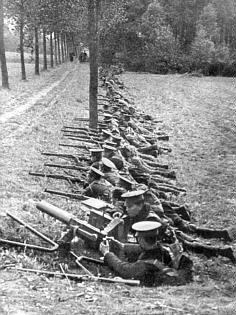
|
World War
I
|
||||
Before he went off to his training he made one final gift to his beloved East End. He bought a house, 29 Stepney Green, as a centre for the work he had started and was now leaving to others. He went into training camp at Didcot, and in due course was gazetted a Second Lieutenant and posted to the 9th Battalion Royal Fusiliers in which many of his scout lads from Bethnal Green had already enlisted. He went to France in due course, and in April 1915, he and his brother Colwyn obtained short leave in order to attend the funeral of their mother, who died on the 30th March. He was promoted Captain early in the year, and on his brother's death in May, became heir to his father's barony. He shared in the attack on the Hohensollern Redoubt, south of La Basée, in which his well-trained and well-led battalion played a distinguished part. In this fight, Captain Roland Philipps greatly distinguished himself. He was awarded the Military Cross, and the official account of his services, published in the London Gazette, stated that it was "in recognition of conspicuous gallantry and devotion to duty." Although wounded severely, he kept his men well in hand, himself killing four of the enemy with his revolver. He stuck to his post and repelled three attacks. He received three bullet wounds and a severe cut in the encounter, and in giving Sir Robert Baden Powell an account of the fight, he mentioned that his three wounds served to remind him of the three points of his scout promise. He made a rapid recovery, and came home for a short rest before rejoining his battalion for duty. While enjoying this respite he attended an investiture in Buckingham Palace, and was there decorated by the King with the Cross that his splendid gallantry had won. In acknowledging the congratulations of a friend, he wrote that all the honour belongs to the men, who are brave and cheery beyond all words. My own was just the happiness and great good fortune of being their leader. Roland devoted to the army the same skills he had put at scouting's service. His record was a distinguished one and his leaves were spent in England where he set himself -and naturally achieved- the objective of forming at least one new scout troop every time. |
